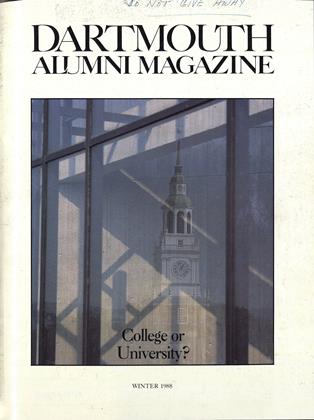Franklin Folsom '28 and Connie Fledderjohann with Gerda Lawrence, The Great Peace March (Ocean Tree Books) This is the story of the 1986 cross country march that 1,200 people made to demand the end of the nuclear arms race. Folsom, the oldest marcher, was a Rhodes Scholar, has authored 40 children's books and six nonfiction books, and has long been a peace activist.
Robert Skutch '46, The Day theWorld. Forgot (Celestial Arts) This short modern-day fairy tale poses the question: what would happen if world leaders replaced the logic of armament with the logic of disarmament? Skutch, the co-founder and director of the Foundation for Inner Peace, lives in Marin County, California.
Shepard Robinson, ManufacturedHousing: What Is It, Where It Is, HowIt Operates (Ingleside Publishing) Robinson, a columnist for Automation In Housing magazine, has written a book that compares the potential revolution in housing to two other American industrial revolutions of the last two decades: computerized typesetting and the replacement of the ditchdigging crew with the backhoe. Robinson discusses the history of and recent trends in industrialized building, covering such topics as energy conservation, federal codes, and labor shortages.
Mark Byers, Don Samuelson '62, and Gordon Williamson, Lawyers inTransition: Planning a Life in the Law (Barkley Company, Inc.) The authors say this is a book for marking up—writing marginal notes and filling in the many self-assessment grids featured in the text. To counter what they see as a rash of "poorly thoughtout job and career decisions," the authors offer detailed advice —about how lawyers can map out and achieve career goals, "no matter what choices are or are not open to you." Samuelson, head of Samuelson Associates human resources and consulting firm, was associate dean of the University of Chicago Law School.
A. Roger Ekirch '72, Bound forAmerica: The Transportation of BritishConvicts to the Colonies, 1118—1115 (Clarendon Press) In this scholarly work, Ekirch, a history professor at Virginia Polytechnic Institute and State University, details the history and social consequences of transportation, which, he writes, was Britain's most severe sanction other than the death penalty. Included is an examination of the relatively low rate of crime committed by convicts after their arrival in America.
David B. Damiano '75 and John B. Little, A Course in Linear Algebra (Harcourt Brace Jovanovich) The authors are members of the mathematics department at Holy Cross.
Louise Erdrich '76, Tracks (Henry Holt) Highly acclaimed author Erdrich has done it again. The early years—1912—1919—of characters from her other novels, Love Medicine and The Beet Queen, are revealed from the perspectives of two storytellers in Tracks. The novel of personal endurance and cultural change is set against the backdrop of the loss of Chippewa tribal land in North Dakota. Defining Erdrich's place in the American literary landscape, critic Jean Strouse writes in the New York Times Book Review, "Erdrich's novels, regional in the best sense, are 'about' the experience of Native Americans the way Toni Morrison's are about black people, William Faulkner's and Eudora Welty's about the South, Philip Roth's and Bernard Malamud's about Jews: the specificity implies nothing provincial or small."
 View Full Issue
View Full Issue
More From This Issue
-
 Cover Story
Cover StoryIs "The College" a College?
December 1988 By James O. Freedman -
 Feature
FeatureThe Compleat Engineer
December 1988 By Samuel C. Florman '46 -
 Feature
FeatureIs Vietnam Still Claiming Some of Us?
December 1988 By Karen Endicott -
 Feature
FeatureThe Man Who Invented the Ant Farm (Not to Mention the Ant Coal Mine)
December 1988 By Lee Michaelides -
 Article
ArticleCUTTING BONE
December 1988 -
 Article
ArticleBEYOND INTUITION
December 1988 By J. Laurie Snell







